Katyn is a polonais film of genre Drama directed by Andrzej Wajda released in USA on 18 february 2009 with Maja Ostaszewska
Katyn (2007)
Post mortem. Opowiesc katynska

If you like this film, let us know!
Katyń ([ˈkatɨɲ]) is a 2007 Polish film about the 1940 Katyn massacre, directed by Academy Honorary Award winner Andrzej Wajda. It is based on the book Post Mortem: The Story of Katyn by Andrzej Mularczyk. It was nominated for Best Foreign Language Film for the 80th Academy Awards.
Synopsis
The events of Katyn are relayed through the eyes of the women, the mothers, wives, and daughters of the victims executed on Stalin's orders by the NKVD in 1940.Actors

Maja Ostaszewska
(Anna)
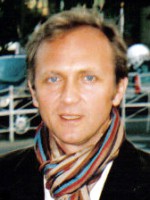
Andrzej Chyra
(Jerzy)

Danuta Stenka
(General's Wife)

Paweł Małaszyński
(Pilot Lieutenant)

Wiktoria Gąsiewska
Comments
Leave comment :
Suggestions of similar film to Katyn
There are 32 films with the same actors, 38 films with the same director, 63678 with the same cinematographic genres (including 1003 with exactly the same 3 genres than Katyn), 8445 films with the same themes (including 16 films with the same 3 themes than Katyn), to have finally 70 suggestions of similar films.If you liked Katyn, you will probably like those similar films :
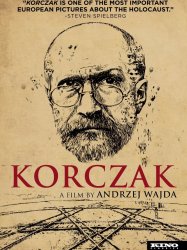
Korczak (1990)
, 1h55Directed by Andrzej Wajda
Origin Pologne
Genres Drama, War, Biography, Historical
Themes Films about religion, Political films, Films about Jews and Judaism
Actors Wojciech Pszoniak, Aleksander Bardini, Ewa Dałkowska, Anna Mucha, Agnieszka Krukówna, Teresa Budzisz-Krzyżanowska
Rating73%





Le film se passe pendant la Seconde Guerre mondiale, en 1942, dans le ghetto de Varsovie. Janusz Korczak a la charge de plusieurs centaines d'orphelins : il doit subvenir à leurs besoins dans des conditions très difficiles. On peut voir, par exemple, sur des photos d'époque prises dans ces orphelinats, que les enfants étaient pieds nus.

Ashes and Diamonds (1958)
, 1h43Directed by Janusz Morgenstern, Andrzej Wajda
Origin Pologne
Genres Drama, War, Romance
Themes Politique, Political films
Actors Bogumił Kobiela, Barbara Krafftówna, Zbigniew Skowroński, Aleksander Sewruk
Rating76%





In an unnamed small Polish town on May 8, 1945, the day Germany officially surrendered, Maciek (Zbigniew Cybulski) and Andrzej (Adam Pawlikowski) are Home Army soldiers who have been assigned to assassinate the communist Commissar Szczuka (Wacław Zastrzeżyński), but fail in their first attempt to ambush him, killing two civilian cement plant workers instead. They are given a second chance in the town's leading hotel and banquet hall, Monopol.

Man of Iron (1981)
, 2h20Directed by Andrzej Wajda
Origin Pologne
Genres Drama, Historical
Themes Films about the labor movement, Political films
Actors Jerzy Radziwiłowicz, Krystyna Janda, Bogusław Linda, Artur Barciś, Marian Opania, Andrzej Seweryn
Rating72%





The film is set in Gdansk in 1980. In Gdansk shipyard workers strike continues. Among them, an important role is played by activist Strike Committee, Maciek Tomczyk (played by Jerzy Radziwiłowicz). Radio journalist, editor Winkel (Marian Opania) is ordered by the deputy chairman of Radio Committee (Janusz Gajos) to achieve coverage compromising Tomczyk. Is sent to Gdansk, where a representative of the authorities Badecki (Franciszek Trzeciak) realizes the importance of his job.
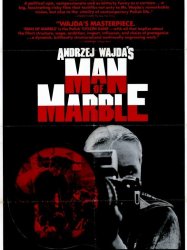
Man of Marble (1977)
, 2h40Directed by Andrzej Wajda
Origin Pologne
Genres Drama, Historical
Themes Political films
Actors Krystyna Janda, Jerzy Radziwiłowicz, Tadeusz Łomnicki, Krystyna Zachwatowicz-Wajda, Kazimierz Kaczor, Ewa Ziętek
Rating76%





Agnieszka, is a young filmmaker who is making her film thesis on Mateusz Birkut, a bricklayer elevated as a hero in a stunt to increase construction efficiency and brick quotas. However, who has since had a fall from grace of the Party and other officials. His current whereabouts seem to have been lost two decades later, and she attempts to piece together the details of his downfall. Agnieszka has difficulty making the film from archival sources and museum collections, but little work remains outside of official propaganda.
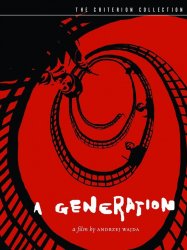
A Generation (1955)
, 1h23Directed by Janusz Morgenstern, Andrzej Wajda
Origin Pologne
Genres Drama, War
Themes Political films
Actors Tadeusz Łomnicki, Roman Polanski, Tadeusz Janczar, Ludwik Benoit, Tadeusz Fijewski, Kazimierz Wichniarz
Rating70%





A Generation is set in Wola, a working-class section of Warsaw, in 1942 and tells the stories of two young men at odds with the Germans occupation of Poland. The young protagonist, Stach (Tadeusz Łomnicki), is living in squalor on the outskirts of the city and carrying out wayward acts of theft and rebellion. After a friend is killed attempting to heist coal from a German supply train, he finds work as an apprentice at a furniture workshop, where he becomes involved in an underground communist resistance cell guided first by a friendly journeyman there who in turn introduces Stach to the beautiful Dorota (Urszula Modrzyńska). An outsider, Jasio Krone (Tadeusz Janczar), the temperamental son of an elderly veteran, is initially reluctant to join the struggle but finally commits himself, running relief operations in the Jewish ghetto during the uprising there.

Kanal (1957)
, 1h35Directed by Janusz Morgenstern, Andrzej Wajda
Origin Pologne
Genres Drama, War
Themes Political films
Actors Tadeusz Janczar, Wieńczysław Gliński, Vladek Sheybal, Stanisław Mikulski, Emil Karewicz, Jan Englert
Rating78%





It is 25 September 1944, during the last days of the Warsaw Uprising. Lieutenant Zadra leads a unit of 43 soldiers and civilians to a new position amidst the ruins of the now isolated southern Mokotów district of Warsaw.

Lotna (1959)
, 1h30Directed by Andrzej Wajda
Origin Pologne
Genres Drama, War
Themes Political films
Actors Roman Polanski, Wiesław Gołas, Czesław Piaskowski
Rating60%





Poland has been invaded by Nazi Germany. Lotna, a beautiful mare that belonged to a wealthy nobleman, is given to Captain Chodakiewicz (Jerzy Pichelski), the commander of a Polish Cavalry squadron, and immediately becomes a bone of contention for everyone in the unit.
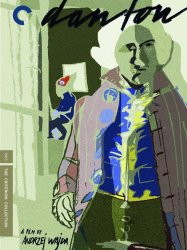
Danton (1983)
, 2h16Directed by Andrzej Wajda
Origin Pologne
Genres Drama, Biography, Historical
Themes Théâtre, Political films, Films based on plays, Histoire de France, French Revolution films
Actors Gérard Depardieu, Wojciech Pszoniak, Anne Alvaro, Patrice Chéreau, Bogusław Linda, Roger Planchon
Rating73%





The film begins in the spring of 1794, when the Reign of Terror was in full swing. On the borders of Paris, any vehicles entering Paris, including the carriage of Danton, who has just ridden in, are being searched. Robespierre, meanwhile, is sick in his bed. His landlady's daughter, Éléonore Duplay, attempts to comfort him, but is unable to. Her nephew, whom she is taking care of, is meanwhile being made to memorize lines from the Declaration of the Rights of Man and Citizen. Back in the streets of Paris, starving lines of people, waiting for bread, discuss the possible reasons for the lack of it. Whether or not it is an enemy plot, the people do know that they are hungry, and that hunger leads to revolt. Once the bread store actually opens, and they finally begin to receive their bread, they are distracted by their other source of faith and hope in life: Danton. As Robespierre is watching, Danton is swarmed by a mob of supporters and fans, who all cry out for help. Robespierre, in his flat, is visited by Heron, the chief of the secret police, and instructs him to destroy the print shop of Camille Desmoulins, who is publishing pro-Dantonist circulars.
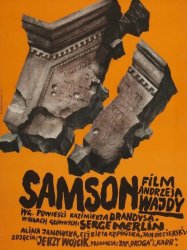
Samson (1961)
, 1h57Directed by Andrzej Wajda, Andrzej Żuławski
Origin Pologne
Genres Drama, War, Adventure, Romance
Themes Films about religion, Political films, Films based on the Bible, Films about Jews and Judaism
Actors Serge Merlin, Beata Tyszkiewicz, Alina Janowska, Elżbieta Kępińska, Tadeusz Bartosik, Roman Polanski
Rating62%





A dark coming-of-age film, Samson follows its Jewish protagonist (Serge Merlin) from an anti-Semitic private school to a prison, then into a Jewish ghetto, and finally over the ghetto wall to the outside world. Wajda uses this journey as a means to explore expressionist cinematography and the weighty issues facing the Jewish people.
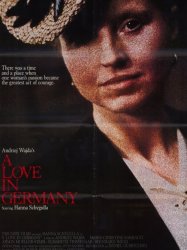
A Love in Germany (1983)
, 2h12Directed by Andrzej Wajda
Origin German
Genres Drama
Themes Films about sexuality, Political films
Actors Hanna Schygulla, Armin Mueller-Stahl, Ralf Wolter, Daniel Olbrychski, Marie-Christine Barrault, Bernhard Wicki
Rating65%





The story takes place in a little German town at the border to Switzerland. The owner of the local fruit-and-vegetables shop has been called up. His shop has a key function for the town's supply situation. His customers know from World War I how rationing can make the owner of such a shop very rich if only he's egoistic enough to get corrupted by well-heeled customers who don't care whether their poorer country fellowmen's families starve. So when his wife Paulina starts to run the shop alone, her character is subsequently of public interest for all citizens who are concerned about the well-being of their families during the ongoing war. Paulina shares the fate of other soldier's wives who constantly face the fear her husband might return crippled, maimed or not at all. But because her husband's shop is highly important for the town's community, she gets somebody who can ease her working load. She is also luckier than other women for she is still young and attractive. So is the prisoner of war named Stanislaus who must serve her. She obviously finds him handsome and relishes that he has to obey all her commands. So she decides she doesn't need to be one of the lonesome wives anymore. When she seduces him she finds him very virile and they sometimes celebrate their love even literally in the open. Finally a town's official informs her that her evident bliss leads other women to doubts about her integrity. Still she doesn't let go of her love affair although the town official keeps on warning her that under the prevailing Nazi laws her adultery is punishable as "Rassenschande". Paulina keeps on putting the Polish POW in lethal danger until he is finally taken to court and sentenced to death. Paulina is imprisoned for two years. Decades later her son and her grandson visit the still existing little town in order to confront the man who warned Paulina repeatedly but in the end let her go down. The both of them are appalled when they realise he still lives in the very town where the citizens forced him to take action on Paulina and he doesn't hide.
 Connection
Connection